|
|
|
Sort Order |
|
|
|
Items / Page
|
|
|
|
|
|
|
| Srl | Item |
| 1 |
ID:
142128
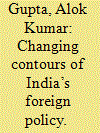

|
|
|
|
|
| Summary/Abstract |
Undoubtedly, Modi’s international engagements were a continuation of India’s foreign policy under the preceding UPA government led by Congress. But he injected a new energy into the relationships with neighbours like Bhutan and Nepal, and major powers like China and the US. The present political leadership has made clear to the immediate neighbourhood that India is ready to share its prosperity because the policy makers understand peace could be established only through prosperity and would enhance constructive engagement and a more integrated and inter-connected sub-continent. Modi rather than making India a marginal receiver of the dispensation of the international system has lifted India’s status as one of the dispensation of the international system.
|
|
|
|
|
|
|
|
|
|
|
|
|
|
|
|
| 2 |
ID:
142142


|
|
|
|
|
| Summary/Abstract |
It is in favour of U.S. that there should be a strong, growing and stable India, which in turn could lead to a stable political and diplomatic environment in Asia and Indian Ocean. India, at the same time also wants to do some constructive efforts towards climate change, which should have multi-dimensional approach. India is definitely open to adopting a more energy efficient form of industrialization and urbanization if the developed countries like U.S. provide meaningful finances and access to technologies. India has both the integrity and vision to do so and promote non-polluting renewable energy, reducing and recycling waste, and utilizing sustainable agricultural practices. In order to achieve its niche in the global climate regime U.S. can play an active role. Giving a helping hand to India and moving it towards the goal of efficient industrialization can be considered a win-win situation for the U.S. in term of climate change, stable international order and extension of U.S. foreign policy. The Indo-U.S. civil nuclear deal is a step towards the partnership of both the nations towards the effective and efficient industrialization and it can cement the ties between the two nations. South India has an especially significant role to play in India’s quest to achieve 175 GW of renewable energy by 2022.
|
|
|
|
|
|
|
|
|
|
|
|
|
|
|
|
| 3 |
ID:
142132


|
|
|
|
|
| Summary/Abstract |
The contributions of Modi in the field of foreign policy have been his visits to Bhutan and Nepal after becoming the prime minister which was unheard of earlier. That has boosted the Himalayan spheres which were ignored for almost seven decades. His invitation to the heads of these countries for his oath taking ceremony was to continue the trajectory of good friendly relations with neighbours while also removing any apprehensions of these nations against India. He seems to be determined to streamline the sea route of India which became the easy route of terrorist outfits. Moreover he has been trying to connect India with the disconnected part of the world. These factors will pay great dividends in the future if India is sincerely committed to shape a strong strategic culture through its cohesive foreign policy.
|
|
|
|
|
|
|
|
|
|
|
|
|
|
|
|
| 4 |
ID:
142131
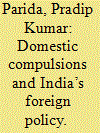

|
|
|
|
|
| Summary/Abstract |
We have to bring some sort of rough consensus among all the groups, political parties, ideological groups, ethnic groups regarding number of domestic issues. Rather our differences of opinion should not be known to outside. It must be solved within. Then only we can think of a strong foreign policy having rooted in domestic issues, with more or less consensuses among all the stakeholders. Today, as India itself has moved to the center of global politics with an increase in its economic and military capabilities, it is being asked to become a stakeholder. India is a rising power in an international system that is in flux, and it will have to make certain choices that probably will define the contours of Indian foreign policy for years to come. The stakes are too high for India as well as the international community.
|
|
|
|
|
|
|
|
|
|
|
|
|
|
|
|
| 5 |
ID:
142134
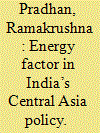

|
|
|
|
|
| Summary/Abstract |
India’s broader foreign policy benefits its energy outreach policies and particularly from the overseas investments of its national companies. From the energy outreach point by going with the maxim of C. Raja Mohan India’s foreign policy strategy divides the world into three concentric circles – immediate neighbourhood, extended neighbour and global stage. Energy interests of India helped her to promote her interests in each of these circles. The benefits of India are particularly clear in the Persian Gulf, Russia and Africa. At the Central Asian front India has a tag of late comer and slow starter. It seems a quite disinterested power in the region. Its disparate policies need reform and strategies need reintegration with the backing of economic muscle and political willpower if India wants to play a decisive role in the region. The July, 2015 visit of Indian Prime Minister Mr. Modi is a positive step in this direction. During this visit New Delhi has signed several bilateral energy agreements with the Central Asian Republics and has paved a way forward for positive engagement with both the regions.
|
|
|
|
|
|
|
|
|
|
|
|
|
|
|
|
| 6 |
ID:
142123
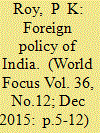

|
|
|
|
|
| Summary/Abstract |
The foreign policy of a country is conceived, designed, and formulated to safeguard and promote its national interests, in her external milieu, in the conduct of relations with other countries, bilaterally and multilaterally. It is a direct reflection of a country’s traditional values and overall national policies, her aspirations and self-perception. In the Indian context, the aim and objective of the Foreign Policy of India is that of an independent, developing and democratic country, to safeguard and promote its national interests and be the enabler of Indian developmental processes through positive and proactive external engagement. It is to be a facilitator of economic development and an instrument to ensure security from external threats so as to bring prosperity to the people of India. It seeks to leverage international relationships in enhancing trade and investment, in assisting infrastructure development, technology transfers to boost manufacturing sector and establish peace and tranquillity in the region.
|
|
|
|
|
|
|
|
|
|
|
|
|
|
|
|
| 7 |
ID:
142125
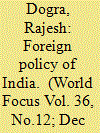

|
|
|
|
|
| Summary/Abstract |
A grand external strategy would require that interactions between different strategic objectives be examined to arrive at the right balance. There is clearly a possibility of a trade off between some interactive objectives, and even between components of an objective. Despite the heightened expectation of the global community, the implications of India’s enhanced role in global issues and governance needs to be looked at within the parameters of its growth and security objectives. In case of contradictions, the former should be given lower priority in the conduct of the country’s foreign policy. This does not, in any sense, imply an abdication of global responsibilities, but rather that India cannot afford to let them pose a trade-off on the more important aspects of its national security. Today standing on the crossroads of global highways of the international politics and relations, it is India’s moment of millennial opportunity. The challenge is to convert the national hope into reality. To make a great leap in congruence to our collective Vision of 2020, an intellectual foreign policy is the only panacea for all evils.
|
|
|
|
|
|
|
|
|
|
|
|
|
|
|
|
| 8 |
ID:
142129
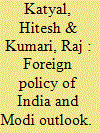

|
|
|
|
|
| Summary/Abstract |
India has followed certain basic principles in the conduct of its foreign policy from which it has not deviated much. In fact some of its basic features such as non-alignment still remain significant and relevant. Even as India is poised to become an economic power in the coming times, it always has and in future too will take necessary steps to save its national interest in every respect i.e. political, strategic and economic terms. India’s foreign policy has been marked by a continuous, progressive change post-1980s based on pragmatic principles. While before 1980 India was primarily supported by the Soviet Union, post-1980s India has dropped all its erstwhile ideological baggage and is cooperating closely with USA, EU, BRICS and East Asia. It has maintained its old relations, albeit in a new avatar, and issues of economics, energy, etc., play a very important role in determining India’s foreign policy today. Its relations with China and USA are maturing, and India is also looking at making inroads into uncharted territories of Africa. India has finally realized that it needs to become practical in its approach to foreign policy if it has to survive in a tough neighbourhood as well as take up leadership positions globally. If Modi truly intends to make foreign policy one of his legacy issues, he will need to sustain the various initiatives that he has undertaken. One is India’s self-perception about its role in world affairs. It aspires to be a major power, but continues to cling to its Third Worldism; it would like to influence events but shies away from proactive policymaking. Second, is India’s perception of the impact of China’s role in world affairs and its response.
|
|
|
|
|
|
|
|
|
|
|
|
|
|
|
|
| 9 |
ID:
142124
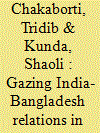

|
|
|
|
|
| Summary/Abstract |
The thumping victory of the 2014 Lok Sabha Election gave Modi a better space to initiate Act East Policy with Bangladesh. Within this short span of time, his gesture towards the Bangladesh government remains quite constructive in its entirety. One of the prime goals of current NDA government was to ‘Make in India’ where inviting foreign investment remains the core idea. To implement this, India needs better connectivity with its immediate neighbors, where Bangladesh, Myanmar and North-Eastern states are directly connected and Nepal and Bhutan are indirectly connected. This connectivity constitutes the major component of India’s current Act East Policy, where economic improvement of the North-Eastern region also remains a prime segment. It is too early to evaluate the current NDA government’s performance with the past government, because both initiated better ties with Bangladesh. However the current trend of Modi’s outlook towards Bangladesh is way ahead of its predecessor. This positive outlook of India was evident from the speech delivered by Prime Minister Narendra Modi, at Dhaka on 6 June, 2015, where he said: “We are not just neighbours. We are two nations bound by the threads of history, religion, culture, language and kinship - and, of course, passion for cricket….We will work together to harness the rich potential of our relationship. And, we will address our challenges in a spirit of friendship and from a position of mutual trust and confidence”.This is no doubt a major pragmatic shift of India’s Bangladesh policy in recent times under NDA government and it is hoped that it would perform much better than the past years and also for the come days.
|
|
|
|
|
|
|
|
|
|
|
|
|
|
|
|
| 10 |
ID:
142137
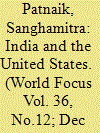

|
|
|
|
|
| Summary/Abstract |
US President Barack Obama defined Indo-US relations as “one of its most important relationships in an uncertain world”. According to J. Tellis, Senior Associate at the Carnegie Endowment for International Peace, Washington D.C., in the backdrop of damage caused by the Khobragade affair, he hoped that both India and United States “will not forget that the special courtesies extended to one another reflects their desire for a stronger strategic bond and hence must not be measured by any picayune notions of mechanistic reciprocity. President Barack Obama is the first U.S. President to visit India twice during office, and is also the first U.S. President to be the chief guest at the Republic Day. ‘Shared Effort; Progress for All’ added a new dimension to Indian foreign policy towards the United States. It envisioned the extensive bilateral strategic and global partnership between the two countries. The pledge of these two major democracies of the world to carry forward their partnership across the spectrum of human endeavor to better their citizens’ lives and that of the global community will certainly set the stage for world peace and security.
|
|
|
|
|
|
|
|
|
|
|
|
|
|
|
|
| 11 |
ID:
142141
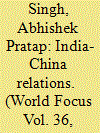

|
|
|
|
|
| Summary/Abstract |
India's trade deficit with China is set to reach record levels in 2015, new trade figures show, with the imbalance after the first three quarters of the year already nearing last year's mark. As India has grown its consumers and corporations have been importing an increasing amount of China’s affordable products but India’s exports to China have not kept pace. While China has a cost advantage in most products, analysts say India is very competitive in the pharmaceutical, textile and some services sectors. That is where it needs more access if it wants to start to rectify the skewed trade balance. Similarly, frictions along the border and Chinese incursions mounted in recent years remain a serious security concern for India. This provides ample scope for anti-China constituency in India. Also China’s solidarity with Pakistan has wider ramifications, especially from an Indian standpoint towards bilateral relations.
|
|
|
|
|
|
|
|
|
|
|
|
|
|
|
|
| 12 |
ID:
142126
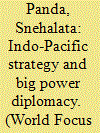

|
|
|
|
|
| Summary/Abstract |
India’s presence in the IO is limited though it has numerous trade routes favouring maritime trade for a number of countries. But over the years it is used in a manner adversarial to India’s interests. China has connected with more littorals in the Ocean and cautioned India against considering it as its “backyard”. Chinese sources deny its expansionist objective in the IOR. But India should not be complacent, rather it should improve its activities in the region for ensuring stability in the environment to expedite socio economic development.
|
|
|
|
|
|
|
|
|
|
|
|
|
|
|
|
| 13 |
ID:
142140
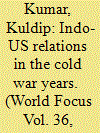

|
|
|
|
|
| Summary/Abstract |
International relations are largely based upon the interplay of conflict and cooperation between and among nations. Every set of relationship is affected by several external factors. Therefore, domestic, regional as well global factors must be considered in analyzing relationship between any two countries. As for Indo-US relations, since days of its freedom struggle Indian leaders were inspired by the American Declaration of Independence and aspired for the American ideas of progress and democracy. The United States, itself a colony of Britain at one time, supported India’s freedom movement to some extent, despite the World War II, which required closed cooperation between Washington and London.
|
|
|
|
|
|
|
|
|
|
|
|
|
|
|
|
| 14 |
ID:
142127
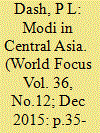

|
|
|
|
|
| Summary/Abstract |
Let us assume that the ‘emperor of India’, Narendra Modi undertook his maiden voyage to Central Asian capitals and Ufa in his special plane Air India One. His intention was to clear the doubt in public perception that he neglected India’s extended neighborhood. Modi ventured into a land where there is no clear ‘India policy’ even after a quarter century of independence. Yet Modi wished to meet and confabulate with the Presidents of these countries within the span of just a week; the purpose of his visit, Indian interests and how both sides could harness their potential for mutual benefit.
|
|
|
|
|
|
|
|
|
|
|
|
|
|
|
|
| 15 |
ID:
142136
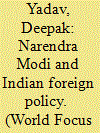

|
|
|
|
|
| Summary/Abstract |
A key advantage for India right now is that a number of countries see it as an opportunity and this moment as the right time to establish or expand relations with it. The high intensity of the government’s external engagement might be attributable to its recognition of this fact and its desire to capitalize on the interest in India. However, a question that lies ahead is: can the Modi government effectively seize the opportunity that this moment offers? A lot will depend on India’s performance, especially its economic performance. Thus, in one way a key foreign policy challenge for the Modi government will be an economic one, with foreign officials and investors asking the same question that Indian voters are: can it deliver on the promise of prosperity? The wooing will continue as long as the answer seems to be yes; if the government is not seen as meeting expectations, the apprehensions about India will start again, with countries exploring other options.
|
|
|
|
|
|
|
|
|
|
|
|
|
|
|
|
| 16 |
ID:
142139
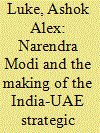

|
|
|
|
|
| Summary/Abstract |
The foundation for India’s robust west Asian engagements in recent times was shaped by Modi’s predecessor, Dr Manmohan Singh who invited the former Saudi king to India in 2006 and in turn visited the kingdom in 2010 which further lead to the strengthening of ties between India and the region. Today the GCC reaches out to India with great significance, and it is here where India’s “look west” policy converges with GCC’s “look east” policy whereby the energy-rich gulf nations explore the Asian markets for their future prospects. Not only does India have the potential to contribute to UAE’s ‘Vision 2021’, but also the two nations can jointly work towards the vision of a 21st Century Asia. Though Benjamin Netanyahu happened to be the first leader from the region whom Mr Modi met, he had chosen carefully to visit an Arab nation first before he visited Israel, at the same time it is clear that India cannot afford to have a zero sum game in the region between the Arabs and Israel just as the big powers have. UAE as a moderate Islamic nation promotes and accepts peaceful coexistence and social harmony serving as an example of multicultural society.
|
|
|
|
|
|
|
|
|
|
|
|
|
|
|
|
| 17 |
ID:
142143
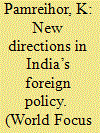

|
|
|
|
|
| Summary/Abstract |
India aspires to be a global power and it certainly has that capability. However, primary challenges lie in the domestic fields of activities; the issues of governance and the pressing problem of corruption, badly undermining India’s core strategy of inclusive growth. The poor state of governance leaves it vulnerable to cross-border problems, to address these domestic issues; India needs to reinforce the righteous circle that is inherent in its liberal and democratic structures and traditions. In fact, addressing issue of policing will be vital to the all-embracing effort to achieve better governance and security. If India does not carry out the governance reforms, it is likely China will continue to command economically and militarily in this century. (Gordon 2015) understands that in order to fully realise its potential and emerge as a truly global power, India has first to neutralise threats originating in South Asian by concentrating on the domestic and neighbourhood sphere of activity. Its goal to be a global player would be realised not necessarily in terms of military assets, but more in terms of other global skill such as possessing vigorous globally connected financial, commercial, industrial, research and educational sectors and developing as trading and investment partners with the quality of rule of law that is needed to play a genuine global economic role. In fact, domestic political stability, peace and equitable economic growth of all sections of society is a sine qua non for India to achieve its goal of emerging as a major power. Since the launch of economic reformsin 1990s, India has been growing persistently. The shift from Non-Alignment to multi-alignment is a national policy; over the last decades India has built up its political, economic and strategic relations with practically every major country. For India to be one key player, it needs to maintain its ethos, culture, heritage and longing for world peace. In fact, it is because of this legacy that India’s emerging today is to seen with no suspicion and fear.
|
|
|
|
|
|
|
|
|
|
|
|
|
|
|
|
| 18 |
ID:
142133
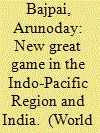

|
|
|
|
|
| Summary/Abstract |
In the post-Cold War scenario, NAM may appear out of place but its cardinal principle-'independence of foreign policy' continues to be relevant in the present context also, because India as the largest democracy with desire to play a respectful role in global affairs needs her own foreign policy choices, which are in tune with her core national interest. The principle of independence of foreign policy has resurfaced as 'strategic autonomy' in the Indian policy making circles. In the wake of the signing of the joint strategic vision statement between India and the US in January 2015, China has appreciated India's principle of 'strategic autonomy' in foreign policy. Thus, India needs to play a balancing act in the ongoing great game between the US and China for protecting her long-term interests and for peace and stability in the Indo-Pacific region.
|
|
|
|
|
|
|
|
|
|
|
|
|
|
|
|
| 19 |
ID:
142138
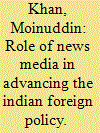

|
|
|
|
|
| Summary/Abstract |
Most of the media moments are spectacles without a deep content. We have limited write-ups scrutinizing the foreign tours of the Prime Minister. The News media does not regularly discuss foreign policy issues, contours of international relations and only indulge in real politic. Indian media should impartially deconstruct the personality cult with national interests. Their understanding of national interests should be broad and visionary. Some experts’ association with some institutions and their personal biasness should not come in way of evaluating the national interests.
|
|
|
|
|
|
|
|
|
|
|
|
|
|
|
|
| 20 |
ID:
142135
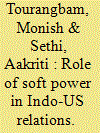

|
|
|
|
|
| Summary/Abstract |
India and America have come a long way since the Cold War era. Both the countries have learned to ‘disagree without being disagreeable’ and are constantly working on the convergences in the relationship. Soft power has been a dominant factor in bringing them closer and will only increase its impact from here on. With dynamic leadership on both the sides, steady economic growth, greater political will and cultural vitality, Indo-US relationship can bring about stability and the ability to weather differences that will also be a part of the relationship. The Indian Diaspora will continue being the torch bearers of ‘Indo-US Bhaichara’, shortening the distance of thousands of miles between both the states. A newfound political intention in Washington DC and New Delhi has helped the states overcome a chequered history of mistrust and build new bridges of understanding. People to people interaction, cultural exchange etc had helped these two societies view each other from different prisms. This vigour is likely to grow, but with the coming US Presidential Elections in 2016, it will be interesting to see what changes it will bring in the relations. A new President with a new administration can make a lot of difference in the relationship. Nevertheless, the Indo-US relations are only likely to grow, even if the momentum and speed might be a little inconsistent.
|
|
|
|
|
|
|
|
|
|
|
|
|
|
|
|
|
|
|
|
|